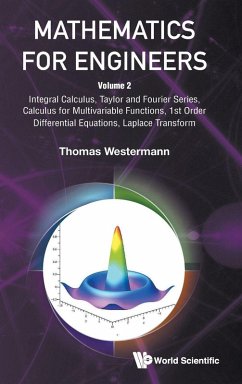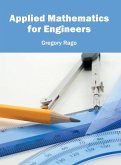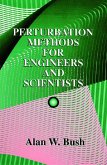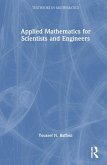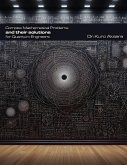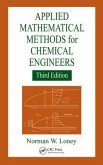- Gebundenes Buch
- Merkliste
- Auf die Merkliste
- Bewerten Bewerten
- Teilen
- Produkt teilen
- Produkterinnerung
- Produkterinnerung
This book offers a comprehensive treatment of the core mathematical topics required for a modern engineering degree. The book begins with an introduction to the basics of mathematical reasoning and builds up the level of complexity as it progresses.
Andere Kunden interessierten sich auch für
![Probability Foundations for Engineers Probability Foundations for Engineers]() Joel A NachlasProbability Foundations for Engineers163,99 €
Joel A NachlasProbability Foundations for Engineers163,99 €![MATHEMATICS FOR ENGINEERS (V2) MATHEMATICS FOR ENGINEERS (V2)]() Thomas WestermannMATHEMATICS FOR ENGINEERS (V2)98,99 €
Thomas WestermannMATHEMATICS FOR ENGINEERS (V2)98,99 €![Applied Mathematics for Engineers Applied Mathematics for Engineers]() Applied Mathematics for Engineers160,99 €
Applied Mathematics for Engineers160,99 €![Perturbation Methods for Engineers and Scientists Perturbation Methods for Engineers and Scientists]() Alan W. BushPerturbation Methods for Engineers and Scientists251,99 €
Alan W. BushPerturbation Methods for Engineers and Scientists251,99 €![Applied Mathematics for Scientists and Engineers Applied Mathematics for Scientists and Engineers]() Youssef RaffoulApplied Mathematics for Scientists and Engineers260,99 €
Youssef RaffoulApplied Mathematics for Scientists and Engineers260,99 €![Complex Mathematical Problems and Their Solutions for Quantum Engineers Complex Mathematical Problems and Their Solutions for Quantum Engineers]() Kuro AksaraComplex Mathematical Problems and Their Solutions for Quantum Engineers95,99 €
Kuro AksaraComplex Mathematical Problems and Their Solutions for Quantum Engineers95,99 €![Applied Mathematical Methods for Chemical Engineers Applied Mathematical Methods for Chemical Engineers]() Norman W LoneyApplied Mathematical Methods for Chemical Engineers198,99 €
Norman W LoneyApplied Mathematical Methods for Chemical Engineers198,99 €-
-
-
This book offers a comprehensive treatment of the core mathematical topics required for a modern engineering degree. The book begins with an introduction to the basics of mathematical reasoning and builds up the level of complexity as it progresses.
Hinweis: Dieser Artikel kann nur an eine deutsche Lieferadresse ausgeliefert werden.
Hinweis: Dieser Artikel kann nur an eine deutsche Lieferadresse ausgeliefert werden.
Produktdetails
- Produktdetails
- Verlag: Taylor & Francis Ltd
- Seitenzahl: 652
- Erscheinungstermin: 13. März 2025
- Englisch
- Abmessung: 254mm x 178mm
- ISBN-13: 9781032505442
- ISBN-10: 1032505443
- Artikelnr.: 71774944
- Herstellerkennzeichnung
- Libri GmbH
- Europaallee 1
- 36244 Bad Hersfeld
- gpsr@libri.de
- Verlag: Taylor & Francis Ltd
- Seitenzahl: 652
- Erscheinungstermin: 13. März 2025
- Englisch
- Abmessung: 254mm x 178mm
- ISBN-13: 9781032505442
- ISBN-10: 1032505443
- Artikelnr.: 71774944
- Herstellerkennzeichnung
- Libri GmbH
- Europaallee 1
- 36244 Bad Hersfeld
- gpsr@libri.de
Francesc Pozo Montero received his degree in Mathematics from the University of Barcelona in 2000 and completed his PhD in Applied Mathematics at the Universitat Politècnica de Catalunya (UPC) in 2005. Since 2000, he has been a member of the Department of Mathematics at UPC, where he currently holds the position of Full Professor. He also serves as the coordinator of the Control, Data, and Artificial Intelligence research group and is recognized as a Senior Member of IEEE. Francesc Pozo Montero's research interests include condition monitoring, control systems, data-driven modeling, system identification, and structural health monitoring, with a particular emphasis on applications related to wind turbines. He is an Editorial Board Member for several prestigious international journals, including Structural Control and Health Monitoring (Wiley), International Journal of Distributed Sensor Networks (Wiley), Mathematical Problems in Engineering (Wiley), Mathematics (MDPI), Sensors (MDPI), Algorithms (MDPI), Journal of Vibration and Control (Sage), Frontiers in Built Environment (Frontiers), Frontiers in Energy Research (Frontiers), and Energies (MDPI). Francesc Pozo Montero has made substantial contributions to his field, authoring over 70 high-impact journal articles, participating in 23 competitive R&D&I projects, and writing 34 book chapters and 12 books. He has successfully supervised six PhD candidates, filed one invention patent, and established a collaboration contract with an industry partner. His work has also been presented in more than 130 conference papers. Núria Parés Mariné holds a degree in Mathematics (1999) and a PhD in Applied Mathematics (2005) from the Universitat Politècnica de Catalunya (UPC), Barcelona, Spain. As a Full Professor at UPC, she focuses on developing and advancing numerical methods applied to engineering. Over the years, her research has concentrated on three primary areas: result certification, model reduction techniques, and machine learning. Through her innovative approach, she has successfully collaborated with internationally renowned researchers, contributing significantly to the academic and scientific community. Núria Parés Mariné has made substantial contributions to her field, authoring over 25 high-impact journal articles and participating in 19 competitive R&D&I projects. Her prolific output also includes writing three book chapters and ten books. She has guided and supervised three PhD candidates to successful completion, showcasing her dedication to mentoring the next generation of researchers. In addition, she has been involved in technology transfer, establishing a collaboration contract with an industry partner and bridging the gap between academia and real-world applications. Her work has been widely recognized and presented in more than 65 conference papers, illustrating her commitment to disseminating knowledge and sharing advancements with the broader scientific community. Prof. Parés continues to be a leading figure in her research areas, driving innovation and excellence in applied mathematics. Her ongoing efforts in integrating machine learning with traditional numerical methods are paving the way for new, groundbreaking approaches in engineering and related disciplines. Yolanda Vidal Seguí holds a degree in Mathematics (1999) and a PhD in Applied Mathematics (2005) from the Universitat Politècnica de Catalunya (UPC), Barcelona, Spain. She is an Associate Professor at UPC, an IEEE Senior Member, and the coordinator of the Wind Turbine Condition Monitoring (WinTurCoM) research group. Her multidisciplinary expertise spans condition monitoring, structural health monitoring, fault diagnosis and prognosis, predictive maintenance, machine learning, deep learning, artificial intelligence, and mathematical modeling, with a primary focus on wind turbine applications. Dr. Vidal serves on the Editorial Board of several high-impact international journals, including Engineering Applications of AI (Elsevier), Wind Energy (Wiley), Wind Energy Science (Copernicus), Energy Exploration & Exploitation (SAGE), Journal of Vibration and Control (SAGE), IET Renewable Power Generation (IET), Mathematics (MDPI), Sensors (MDPI), Energies (MDPI), Frontiers in Built Environment (Frontiers), and Frontiers in Energy Research (Frontiers). Her academic contributions include over 70 high-impact journal articles, participation in 23 competitive R+D+I projects, 19 book chapters, and 10 books. Dr. Vidal has supervised seven PhD theses, with four currently in progress, highlighting her commitment to mentoring the next generation of researchers. Additionally, she holds an invention patent, has secured a collaboration contract with an industry partner, and has presented over 120 conference papers, cementing her role as a prominent figure in her field. Dr. Vidal's work bridges theoretical advancements and practical applications, driving innovation in renewable energy and structural health monitoring.
I. Mathematical Reasoning. 1. Introduction to Mathematical Reasoning. II
The Set of Complex Numbers. 2. Numerical Sets: The Set of Complex Numbers.
III. Differential Calculus. 3. Functions, Limits, and Continuity. 4.
Differentiation of Functions of a Real Variable. IV Integral Calculus. 5.
Integration. V. Linear algebra. 6. Linear Algebra: Matrices and Systems of
Equations.
The Set of Complex Numbers. 2. Numerical Sets: The Set of Complex Numbers.
III. Differential Calculus. 3. Functions, Limits, and Continuity. 4.
Differentiation of Functions of a Real Variable. IV Integral Calculus. 5.
Integration. V. Linear algebra. 6. Linear Algebra: Matrices and Systems of
Equations.
I. Mathematical Reasoning. 1. Introduction to Mathematical Reasoning. II
The Set of Complex Numbers. 2. Numerical Sets: The Set of Complex Numbers.
III. Differential Calculus. 3. Functions, Limits, and Continuity. 4.
Differentiation of Functions of a Real Variable. IV Integral Calculus. 5.
Integration. V. Linear algebra. 6. Linear Algebra: Matrices and Systems of
Equations.
The Set of Complex Numbers. 2. Numerical Sets: The Set of Complex Numbers.
III. Differential Calculus. 3. Functions, Limits, and Continuity. 4.
Differentiation of Functions of a Real Variable. IV Integral Calculus. 5.
Integration. V. Linear algebra. 6. Linear Algebra: Matrices and Systems of
Equations.



